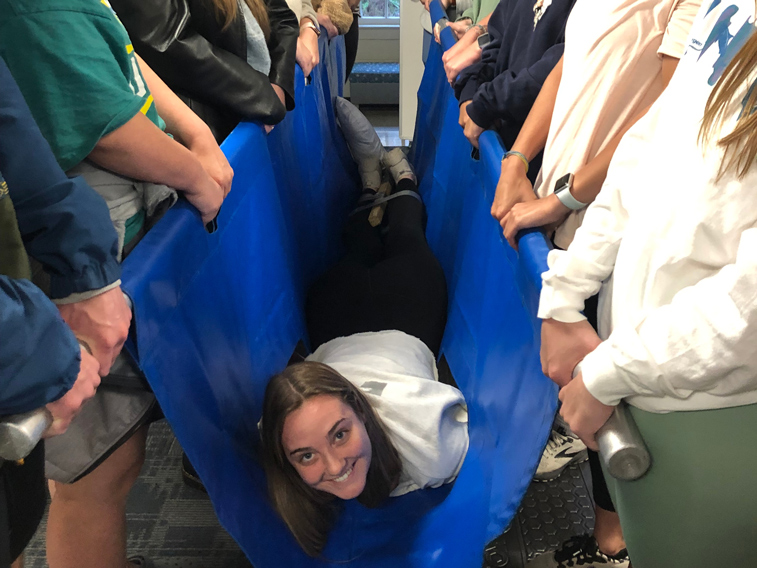About Us
The UNCW Marine Mammal Stranding Program is part of a national network of teams that respond to reports of stranded whales, dolphins and other marine mammals.
Our Story
UNCW’s main hub for stranding research is the Vertebrate Anatomy and Biomechanics Lab, also known as the VABLAB. It was established by Dr. Ann Pabst and Bill McLellan, who in 2022 entrusted the stranding program to a new generation of researchers. The lab has surpassed $10 million in research grants and contracts and earned Pabst and McLellan membership in the exclusive UNCW James F. Merritt Ten Million Dollar Club in 2019.
Now headed by Dr. Tiffany Keenan, program coordinator and a postdoctoral fellow specializing in pygmy and dwarf whale species, and Dr. Michael Tift, academic lead and a UNCW assistant professor of biology and marine biology, the program continues its work in the research and conservation of marine mammals. They are joined in their efforts by Dr. Julia Buck, Dr. Patrick Erwin, Dr. Heather Koopman and Dr. Lori Schweikert, biology and marine biology faculty members who directly support the program through collaborative research projects, grants and graduate student involvement. Rounding out the team are Dr. Stephen Anderson, veterinarian, and veterinary technician Celeste Anderson.
UNCW undergraduate and graduate students often volunteer for the program, gaining valuable research experience as they work alongside experts in marine mammalogy. Although the program’s response area is typically along the southeastern North Carolina coast, the reputation of UNCW’s marine mammal research often finds the team packing up and heading anywhere along the East Coast, and sometimes worldwide.
Program Beginnings
Dr. Pabst and Mr. McLellan, who met while working at the Smithsonian Institution, came to UNCW in 1995.
When the carcass of a subadult male whale washed up at Carolina Beach in 2003, the team’s response was one of the first under a grant through the National Oceanic and Atmospheric Administration's then-new Prescott Stranding Assistance Program. Seventeen years later, the whale carcass was confirmed by NOAA researchers to be a member of a previously undiscovered baleen whale species now known as Rice’s whale.
Other noteworthy responses by the Marine Mammal Stranding Team during Pabst and McLellan’s tenure included rescuing a young Arctic seal on Wrightsville Beach and discovering an abundance of rare beaked whales off Cape Hatteras.
For 20 years, Pabst and McLellan conducted aerial surveys for the U.S. Navy and NOAA. Despite their research and accolades, one of their greatest points of pride is the family they nurtured in the VABLAB. Many student volunteers have gone on to careers in marine biology. Some have become leading experts in the field, like Dr. Keenan and Dr. Michelle Barbieri, a NOAA Fisheries scientist who leads the Hawaiian Monk Seal Research Program.
The new leadership team is securing critical funding to support the program’s work and was recently awarded a federal grant through NOAA’s John H. Prescott Marine Mammal Rescue Assistance Grant Program.
Join the Wave of Support!
Our Marine Mammal Stranding Program depends on the support of individuals like you. Every contribution, whether big or small, helps support our mission to understand, preserve & protect our marine mammals.

Join Our Team as a Volunteer!
Dive into a world of hands-on learning & marine exploration. Our dynamic team is a mix of volunteers, students, faculty & staff from the Department of Biology & Marine Biology. Fill out our volunteer interest form below & become a valued member of our volunteer community.
